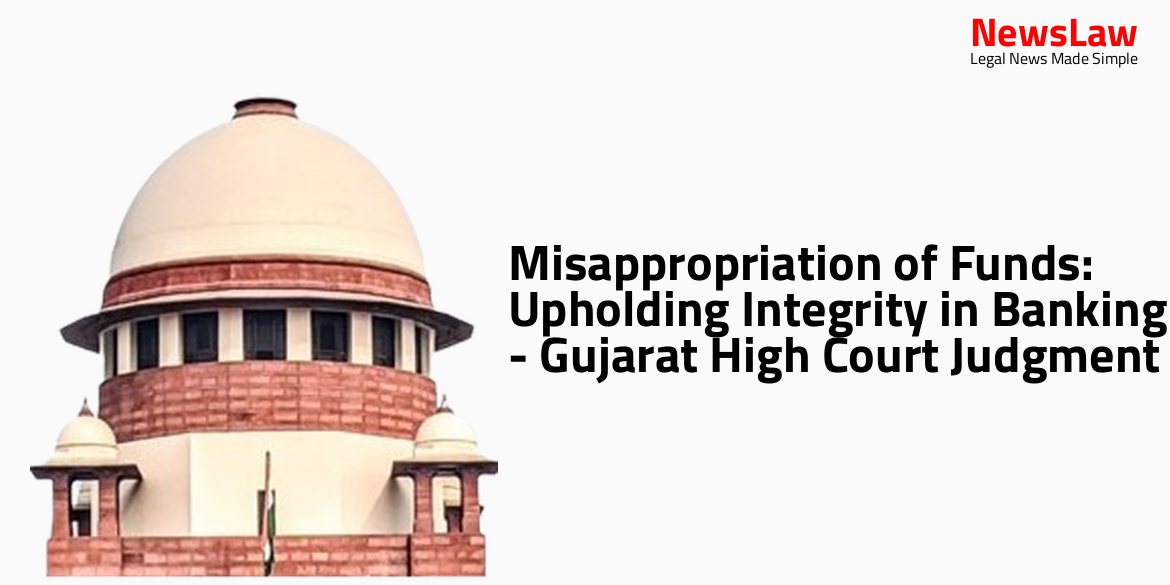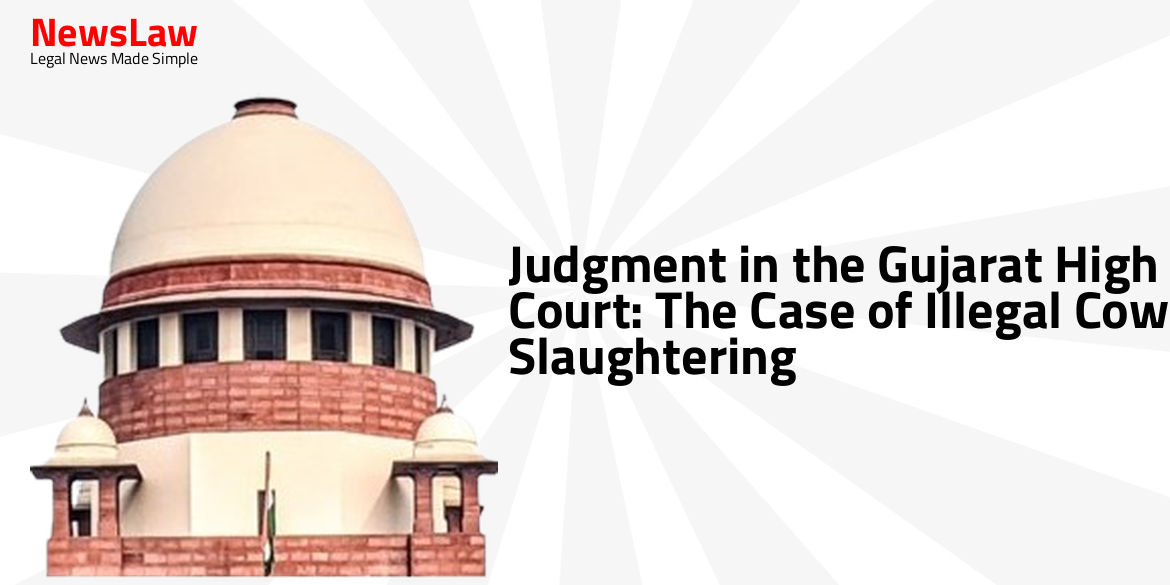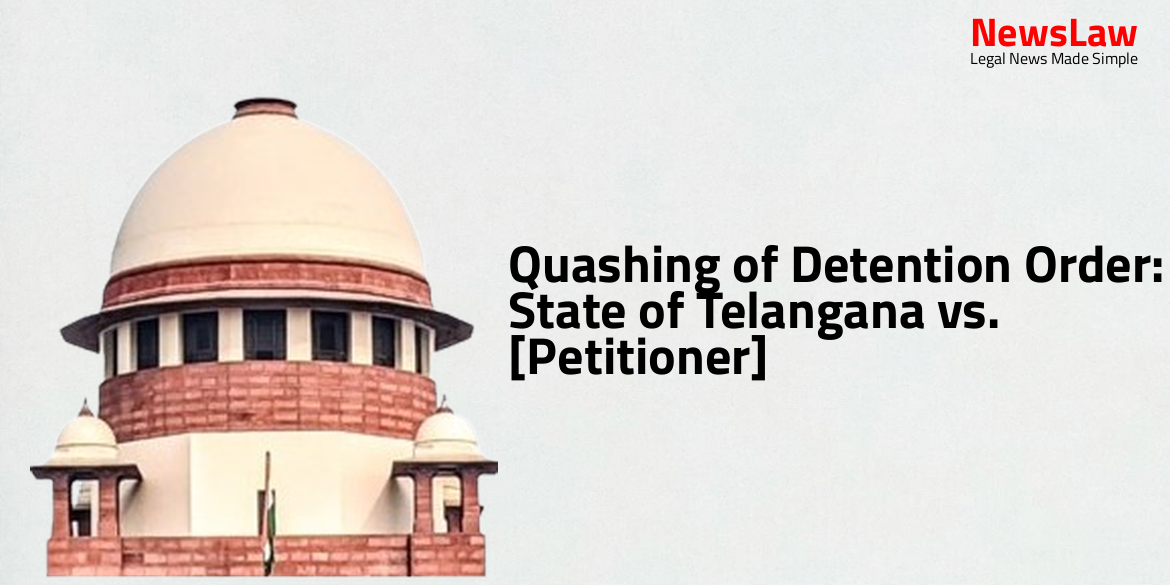In a recent judgment by the Gujarat High Court, a case revolving around the misappropriation of funds and the importance of upholding integrity in the banking sector was thoroughly examined. The case, which highlighted the significant role of honesty and trust in financial institutions, serves as a reminder of the crucial responsibilities bank employees carry. This judgment emphasizes the essential nature of transparency and ethical conduct within the banking industry.
Facts
- The delinquent employee challenged the order of discharge by submitting a statement of claim.
- The inquiry report found the delinquent employee guilty, leading to the imposition of the punishment of discharge from service on 16.08.1991.
- The delinquent employee filed a Reference under Section 10 of the Industrial Disputes Act, 1947, against the order.
- Both the delinquent employee and the Bank Management appealed the order through Letters Patent Appeals.
- The Bank Management contended that the delinquent employee committed gross misconduct by creating a fund shortfall as Head Cashier and temporarily misappropriating Rs.35,000.
- The Central Government Industrial Tribunal found the charges proved but considered the discharge as disproportionate, ordering reinstatement with conditions.
- The Bank Management challenged the Tribunal’s decision through Special Civil Application No.14601 of 2011.
- A brief overview of the incident in 1986 involving the misappropriation of cash amounting to Rs.35,000 and subsequent suspension and charge-sheet issuance.
- The dispute was referred to the Central Government Industrial Tribunal, Ahmedabad, by the Ministry of Labour and Employment, Government of India.
- Multiple Letters Patent Appeals have been filed by both parties regarding the matter.
- Division Bench allowed the Letters Patent Appeals and set aside the order of the Single Judge
- The matter was remitted back to the Single Judge for fresh hearing on its own merits
- Single Judge dismissed the Writ Petition of the delinquent employee and partially allowed the Bank Management’s Writ Petition to modify the punishment
- Counsel for the delinquent employee argued that the Tribunal had the statutory power under Section 11A of the Industrial Disputes Act to modify the order
- Single Judge had earlier passed an interim order directing stay on the order of Central Government Industrial Tribunal and reinstatement of the employee
- Single Judge overturned the Tribunal’s decision without pointing out any statutory or regulatory lapse in the inquiry process
Arguments
- The learned counsel for the delinquent employee argues that there is no legally acceptable evidence against the employee.
- The learned Single Judge should have dismissed the Special Civil Application by the Bank Management and allowed the Writ Petition of the delinquent employee.
- The delinquent employee’s counsel argues that the punishment should not have been modified despite confirmed misconduct.
- Delinquent employee allegedly misappropriated funds and immediately sourced money from his wife’s firm upon being caught, proving the charge.
- Maintaining honesty and integrity is crucial for a bank officer, and the employee’s actions were for self-benefit.
- The charge-sheet was supplied late, and no criminal proceedings were initiated by the Bank Management.
- Cross-examination of witnesses does not provide substantial evidence against the employee.
- The Bank Management lacked following prescribed procedures for cash shortfalls in the branch, casting doubt on the genuineness of the prosecution.
- No documented evidence of cash shortfall or subsequent deposit by the employee was presented.
- Given the proven misappropriation, discharge from service was the appropriate punishment, and the Writ Petition by the Bank Management should have been allowed.
- The evidentiary value of the departmental inquiry was re-evaluated by the Single Judge, and the employee’s written submissions were allegedly not considered.
- The learned Single Judge is alleged to have reappreciated evidence beyond jurisdiction under Article 227 of the Constitution of India.
- The Bank Management contends that there was no inconsistency in the evidence presented during the departmental inquiry and before the Tribunal.
- The Bank Management successfully established the charges against the delinquent employee, who was a Head Cashier, justifying the imposed penalty.
- Criticism is raised against the alteration of punishment by the learned Tribunal and Single Judge based on irrelevant considerations.
- The Bank Management argues that since misconduct was proven, no interference with imposed punishment was warranted.
- It is emphasized that the witnesses provided strong evidence of the delinquent employee’s misappropriation of Rs.35,000.
- The contention is that the findings of the departmental inquiry were fair and not perverse, warranting no alteration in the imposed penalty.
Analysis
- The Tribunal and Single Judge were liberal in substituting the punishment imposed on the delinquent employee.
- Imposing punishment for misconduct is the prerogative of the punishing authority and should not be interfered with lightly.
- The delinquent employee, as a Head Cashier, was responsible for the safekeeping of public money and lacked integrity by committing the act of misconduct.
- The punishment should be commensurate with the gravity of the misconduct and the Tribunal can only interfere if the punishment is highly disproportionate to the guilt of the employee.
- Misappropriation of public money by a bank employee is a serious breach of trust and cannot be viewed lightly.
- Loss of confidence by the Bank management is expected when dealing with such misconduct, justifying the severity of the punishment.
- The nature of the job in a bank requires utmost honesty and integrity, especially when handling customers’ deposits.
- The punishment imposed in cases of misappropriation and loss of confidence must be considered in light of the breach of trust and potential impact on public trust in the banking system.
- The punishment of discharge for a bank employee found guilty of misappropriation is deemed appropriate as it reflects the loss of confidence by the Bank management.
- The discretion of the Tribunal under Section 11A should not be arbitrary and must consider all relevant factors of the case before modifying the punishment.
- The International Labour Association recommended giving Tribunals power to set aside orders of discharge or dismissal and direct reinstatement of the workman.
- Section 11A was inserted in the Industrial Disputes Act, 1947 to grant Tribunals the power to re-evaluate evidence in domestic inquiries and provide appropriate relief to the workman.
- The Tribunal found the domestic inquiry in this case to be flawed and asked the Bank Management to justify the discharge of the employee.
- After reviewing new documentary evidence, the Tribunal concluded that the charges against the employee were proven.
- However, the Tribunal deemed the punishment of discharge to be disproportionately severe for the gravity of the charge and therefore modified it to reinstatement with 50% back-wages and stoppage of two increments.
- Position in Banking demands honesty and integrity.
- Misconduct proven leads to sustaining of punishment unless harsh.
- No leniency for financial irregularities as a Bank employee.
- Loss of confidence is a primary factor for punishment.
- Misappropriation of public money leads to loss of faith by the employer.
- Temporary misappropriation of Rs.35,000/- proved against the employee.
- The Bank Management contended that misappropriation led to loss of faith in the delinquent employee.
- The learned Single Judge disagreed with the liberal punishment substitution by the Tribunal.
- The Single Judge modified the punishment on the higher side without finding the original punishment grossly disproportionate.
- The judgment and orders in Special Civil Applications and the award in Reference CGITA were set aside.
- The punishment of discharge from service imposed by the disciplinary authority was upheld due to proved misappropriation.
- The act of misappropriation by the custodian of public money warranted the upheld punishment.
- The disciplinary authority did not explore other punishments as per rules, and the misappropriation was made good upon detection.
- The considerations of the Tribunal regarding the shockingly disproportionate punishment were deemed perverse and against public interest.
- The Tribunal’s considerations were held to be extraneous and irrelevant in the exercise of power under Section 11A of the Industrial Disputes Act.
Decision
- Letters Patent Appeals No.851 of 2023 and Letters Patent Appeal No.1424 of 2023 by Bank Management allowed
- Letters Patent Appeals Nos.850 of 2023 and 855 of 2023 by delinquent employee dismissed
Case Title: RASHMIKANT GIRDHARLAL DAVE Vs. CHAIRMAN STATE BANK OF INDIA
Case Number: R/LPA/850/2023



